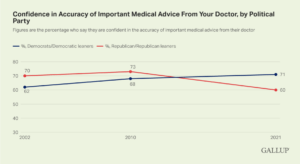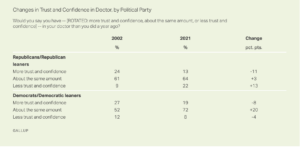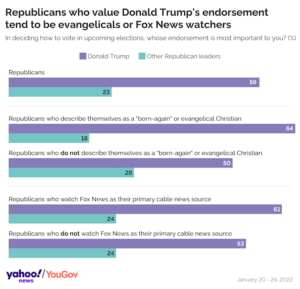Pastors who find some congregants no longer trusting them as much as before are not alone.
Two new national polls show significant drops in the percentage of Republicans who trust the medical advice their doctors give or who trust their own party’s political candidates unwilling to endorse Donald Trump’s blatant lie that he won the 2020 presidential election.
Especially over the last two years, pastors nationwide have reported increased congregational conflict and pressure from congregants who don’t believe the threat of COVID-19 is severe, who don’t believe in masking and vaccinations to reduce the spread of the virus, and who believe their religious values are under attack from forces opposed to Trump.
These views are increasingly encapsulated in Republican Party doctrine, which now includes an official statement that the Jan. 6, 2021, armed insurrection at the United States Capitol was “legitimate political discourse.”
The party recently known for its opposition to abortion and support for business principles has instead become known for its distrust of professional expertise, truth and scientific facts. Likewise, a recent survey of Baptist pastors who resigned during the pandemic found the No. 1 reason was “opposition to leadership,” usually centered on the same issues.
Mistrust of doctors
New data from Gallup shows a 13-point drop in the share of Republicans who say they are confident in the accuracy of important medical advice their doctor gives them. Currently, 60% of Republicans and Republican-leaning independents say they are confident, down from 73% in 2010 and 70% in 2002.
Meanwhile, more Democrats and Democratic leaners are confident now (71%) than were in the past, especially compared with the 62% measured in 2002.

Gallup researchers explain: “As a result, Democrats’ confidence exceeds Republican confidence for the first time in Gallup’s trend.”
The research firm reported these findings from its annual health and health care survey, conducted Nov. 1-16 and noted: “The changes in attitudes about medical advice are consistent with Gallup’s recent findings of partisan divergence in trust in science, more generally.”
As a result, more Republicans than before say they “usually feel it is necessary to check for second opinions or do (their) own research” on medical advice given by physicians. That’s the attitude of 39% of Republicans and Republican-leaners, compared to 26% in 2010 and 29% in 2002. In contrast, 28% of Democrats and Democratic leaners this year say they usually look for other opinions or information on medical issues.
The new data correspond to previous and recurring research showing Republicans are far more likely than other subgroups to be unvaccinated and to have no intention of getting vaccinated — despite widespread medical consensus that vaccines are safe and effective and help stop the spread of disease and death. Gallup notes that throughout the pandemic, Republicans have been less inclined to wear face masks in public or to practice strict social distancing.

Further, a separate question in Gallup’s survey asked Americans whether they have more or less trust and confidence in their doctor than they had a year ago. Here, too, Republican trust has declined.
More Republicans and Republican leaners say their trust in their doctor has declined (22%) in the past year than say it has increased (13%).
In contrast, 19% of Democrats and Democratic leaners say they have greater trust in their doctor, while 8% say they have less.
Majorities of Democrats and Republicans say trust in their doctors hasn’t changed.
Gallup offers this summary of the situation: “Americans still largely trust what their doctor advises them about their health, but they are less confident than they were 11 years ago, though no less confident than in 2002. Over the past two decades, Democrats have become more trusting in their doctor’s advice, but Republicans are now less so. Republicans are also more likely to say they have lost trust in their doctor’s advice over the past year than to say they have gained it.
“Increasing skepticism of science and medical advice among Republicans likely is a significant factor in lagging COVID-19 vaccination rates compared with Democrats and political independents. Primary doctors could be a persuasive source of information for Americans on protecting themselves from the coronavirus. But it appears Republicans are less likely than others to heed their doctor’s advice, which could put them at greater risk of suffering the worst effects of the coronavirus.”
Requiring belief in Trump’s lie
New research from Yahoo News and YouGov now shows that nearly six in 10 Republicans and Republican-leaning independents (57%) say they will not vote in upcoming elections for any candidate who admits that Joe Biden won the presidency “fair and square.”
Only 17% of Republicans said they would consider voting for a candidate who accurately characterizes Biden’s victory as legitimate.
 Again, despite a vast amount of hard evidence that Biden won the election fair and square and decisively, the former president’s self-serving lie has become a doctrine of Republican elected officials and those who hope to get elected in the party.
Again, despite a vast amount of hard evidence that Biden won the election fair and square and decisively, the former president’s self-serving lie has become a doctrine of Republican elected officials and those who hope to get elected in the party.
The new poll found three-fourths (74%) of Republican voters believe the election was stolen from Trump.
Yahoo News reports: “The poll data also helps explain why Republican presidential hopefuls such as Florida Gov. Ron DeSantis now want to spend millions of dollars on special ‘election crimes’ police units tasked with finding fraud where they previously insisted there was none.”
The survey of 1,568 U.S. adults, which was conducted from Jan. 20 to 24, found that when asked which issue they want future candidates to focus on the most, the share of Republicans and Republican-leaning independents who said “stopping Democrats from rigging and stealing elections” (17%) is statistically equivalent to the share who said “bringing down inflation” (19%).
Yahoo News reports that other core conservative policies — save one, also a Trump theme — don’t even come close to this level of zeal: “ending COVID restrictions” (10%), “fighting crime” (8%), “outlawing abortion” (5%), “cutting taxes” (5%), “appointing Supreme Court justices” (2%) and “giving parents more controls over schools” (2%). Only “securing the border” (23%) ranks higher.
Related articles:
Leaving church, part 3: ‘Opposition to leadership’
I’m an infectious disease doctor: Here’s why pastors need to lead their flocks to be vaccinated | Opinion by Leland Allen III
First Baptist Dallas congregation cheers Trump, breaks out into ‘USA!’ chant after he speaks


